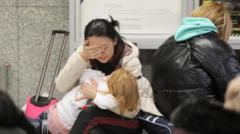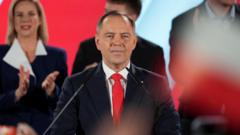Ukrainian communities in Poland are facing significant challenges as reports of anti-Ukrainian sentiment soar. Many refugees, once welcomed with open arms, are now recounting experiences of public abuse, school bullying, and a shift in public opinion that has left them feeling unwelcome.
Growing Anti-Ukrainian Sentiment in Poland: Refugees Speak Out

Growing Anti-Ukrainian Sentiment in Poland: Refugees Speak Out
As Ukraine continues to grapple with war, Ukrainian refugees in Poland report increasing instances of discrimination and xenophobia.
Svitlana, a Ukrainian mother, highlights the troubling changes her daughter has faced at school after a period of kindness from Polish citizens following Russia's invasion in 2022. Despite initial support from Poles, recent months have seen a marked decline in compassion, exacerbated by an intense political atmosphere ahead of Poland's presidential elections. Various parties, including extreme right-wing groups, have exploited these tensions, leading to widespread disinformation campaigns that target Ukrainians. Activists express concern over escalating xenophobia and trauma experienced by refugees who have fled war, while survey data shows a growing reluctance among Poles to accept Ukrainian refugees. As the situation evolves, the impacts of political dynamics on public sentiment will remain a focal point of concern in both societies navigating conflict and crisis.
The article text:
With the ongoing war in Ukraine, Ukrainian refugees residing in Poland are reporting a rise in discrimination and xenophobic sentiments among the local population. Although at the onset of the conflict in 2022 many Poles were eager to help, portions of the community are now exhibiting hostility, with refugees describing unsettling experiences of abuse in schools and public transport.
Svitlana, a Ukrainian mother, recounted how her daughter's once enjoyable school experience has soured. Initially embraced by peers, her daughter recently faced mockery from older classmates who taunted her for speaking Ukrainian, amidst a backdrop of family trauma linked to war. "One boy said 'Go back to Ukraine,'" Svitlana recalled. "It’s frightening to live here now," she added, reflecting a broader sentiment among the Ukrainian community feeling increasingly alienated.
This hostility comes amid rising political tensions as Poland approaches its presidential elections. Activists, like Natalia Panchenko of the 'Stand with Ukraine' Foundation, note a troubling increase in online abuse and real-life incidents where Ukrainians are mistreated, correlating with a growing divergence in public opinion. Recent polls indicate that only 50% of Poles now support accepting Ukrainian refugees, a sharp decline since early in the conflict.
Political candidates are also navigating this shifting landscape, with some distancing themselves from pro-Ukrainian stances to appeal to a centrist electorate increasingly influenced by negative narratives. Notable far-right candidates are openly critical of Ukraine, which diverts attention from earlier sentiments of solidarity expressed by the general population.
Disinformation efforts, often linked to Russian propaganda, are worsening the situation. Social media narratives portray Ukrainians as threats, contributing directly to the rising tensions affecting refugees seeking safety and support in Poland. Experts warn that the full effects of these political and societal shifts may only become evident post-election, raising alarms about the future of Ukrainian refugees in Poland amidst a worrying trend of increasing xenophobia.
The article text:
With the ongoing war in Ukraine, Ukrainian refugees residing in Poland are reporting a rise in discrimination and xenophobic sentiments among the local population. Although at the onset of the conflict in 2022 many Poles were eager to help, portions of the community are now exhibiting hostility, with refugees describing unsettling experiences of abuse in schools and public transport.
Svitlana, a Ukrainian mother, recounted how her daughter's once enjoyable school experience has soured. Initially embraced by peers, her daughter recently faced mockery from older classmates who taunted her for speaking Ukrainian, amidst a backdrop of family trauma linked to war. "One boy said 'Go back to Ukraine,'" Svitlana recalled. "It’s frightening to live here now," she added, reflecting a broader sentiment among the Ukrainian community feeling increasingly alienated.
This hostility comes amid rising political tensions as Poland approaches its presidential elections. Activists, like Natalia Panchenko of the 'Stand with Ukraine' Foundation, note a troubling increase in online abuse and real-life incidents where Ukrainians are mistreated, correlating with a growing divergence in public opinion. Recent polls indicate that only 50% of Poles now support accepting Ukrainian refugees, a sharp decline since early in the conflict.
Political candidates are also navigating this shifting landscape, with some distancing themselves from pro-Ukrainian stances to appeal to a centrist electorate increasingly influenced by negative narratives. Notable far-right candidates are openly critical of Ukraine, which diverts attention from earlier sentiments of solidarity expressed by the general population.
Disinformation efforts, often linked to Russian propaganda, are worsening the situation. Social media narratives portray Ukrainians as threats, contributing directly to the rising tensions affecting refugees seeking safety and support in Poland. Experts warn that the full effects of these political and societal shifts may only become evident post-election, raising alarms about the future of Ukrainian refugees in Poland amidst a worrying trend of increasing xenophobia.






















